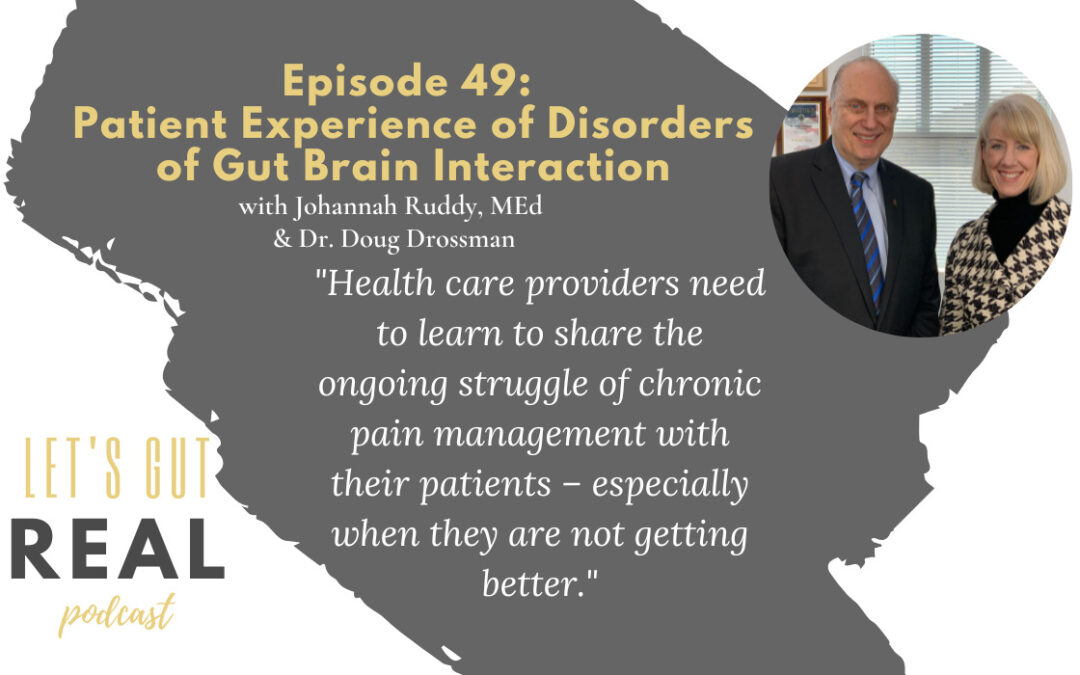Disorders of the gut brain interaction still hold stigma due to how providers interact with their patients. This week I interview Dr. Drossman and Johannah Ruddy about the personal narrative of patients and their positive and negative experiences in the health care system.
Nutrition Pearls for the Patient Experience of Disorders of Gut Brain Interaction:
- The most common type of GI issues seen in primary care are disorders of gut brain interaction.
- In disorders of gut brain interaction impact the brain’s ability to regulate the gut; motility, secretion, and/or pain perception can be impacted leading to symptoms like nausea, vomiting, constipation, diarrhea, and pain.
- Common tests will often show up negative in disorders of gut brain interaction which can lead patients to see these disorders as not real.
- Most patients interviewed in this book came from backgrounds where they experienced an early case of infection that precipitated their GI symptoms.
- Another common trait, noted in the book, in patients with disorders of gut brain interaction is that they were all very high functioning, type A type people, very driven, very perfectionist in nature, always seeking answers, and very inquisitive.
- Another common trait is that all of the patients that were interviewed for this book had lacked a diagnosis for many years or received a misdiagnosis which can lead to a lot of medical trauma.
- Conclusions drawn from this area of research was that it’s often due to a failure in medical care leading to what one may consider ‘health care seeking behaviour’.
- One of the positive outcomes in hearing about the experiences of other patients going through something similar to what you are going through can help to provide a lot of validation and hope.
- It is really valuable for practitioners to understand how important the patient story is in offering patient centered care and not treat patients like a list of symptoms.
Two previous guest of our Let’s Gut Real Podcast, Dr. Drossman and Johannah Ruddy, join us again today to talk about their newly released book. Gut Feelings: The Patient’s Story Personal Accounts of the Illness Journey A Guide for Patients and Doctors Gut Feelings: A Patient’s Story. Now available on Amazon.
Dr. Drossman received his M.D. degree at Albert Einstein College of Medicine and subspecialized in biopsychosocial medicine and Gastroenterology. He received his gastroenterology training at the University of North Carolina where he founded the UNC for Functional GI and Motility Disorders. Currently he is Professor Emeritus of Medicine and Psychiatry in Gastroenterology at UNC. He is a Fellow of the American College of Physicians, a Master of the American College of Gastroenterology, Past-President of the American Psychosomatic Society (1997) and Founder and President of the Rome Foundation for 29 years. In addition, he founded the Drossman Center for the Education and Practice of Biopsychosocial Care as an entity to help train physicians in relationship-centered biopsychosocial care with an emphasis on communication skills and enhancing the patient-doctor relationship.
Dr. Drossman is joined today by co-author Johannah Ruddy who is a national expert, researcher, and writer on teaching communications skills to patients and providers. Johannah currently serves as the Executive Director of the Rome Foundation. She has 22 years of executive leadership experience working with a variety of non-profit organizations nationwide and a strong background in writing for patients as well as a speaker at GI practices, medical centers, and conferences in the area of provider communication and patient advocacy. She holds a Bachelor of science degree from the University of New Mexico in Political Science, a Masters of Education from New Mexico Highlands University and is a doctoral student at Campbell University. She lives in Wake Forest, North Carolina with her husband of 21 years and their two sons.
Dr. Drossman, Johannah Ruddy and I talk about:
- Dr. Drossman’s and Mrs. Ruddy’s backgrounds and how they came to work together
- Disorders of gut brain interaction
- Typical patient experiences with these diagnoses and the reasons why they hold so much stigma
- Each of their biggest learnings as practitioner and patient in doing these interviews
- Common mistakes/pitfalls practitioners experience in working with patients and how this may be a disservice to our patients
- The key things clinicians can take away from this book, with a focus on patient centred care.
- How patients advocate for themselves to feel heard in their journey
You can find their new book: Gut Feelings: The Patient’s Story Personal Accounts of the Illness Journey A Guide for Patients and Doctors Gut Feelings: A Patient’s Story which is available on Amazon: https://romedross.video/patient-story
You can find their previous book: Gut Feelings- Disorders of Gut-Brain Interactions, A Guide for Patients and Doctors which is also available on Amazon: https://romedross.video/GutFeelingsWebsite
Check out the video version of the audio recording excerpt featured in this presentation: https://romedross.video/LesleyGutFeelings4X
Connect with Johannah on Instagram @johannahruddy on Twitter @JohannahRuddy or on LinkedIn.
Learn more about the Theromefoundation.org or here: https://romeonline.org



Recent Comments